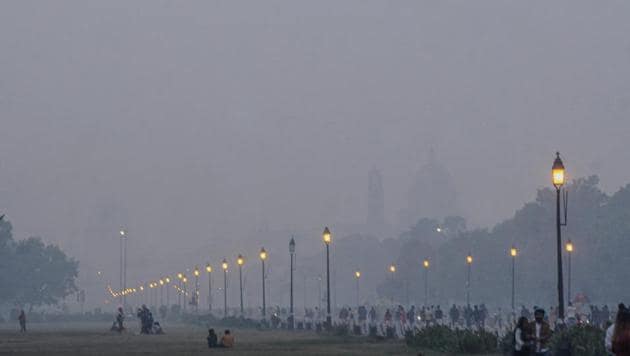

The overall Air Quality Index (AQI) of the city was recorded at an abysmal 431 on Saturday morning
A thick layer of smog covered Delhi for the third day in a row on Saturday as the air quality remained in the ‘severe’ category that is hazardous for health.
The overall Air Quality Index (AQI) of the city was recorded at an abysmal 431 on Saturday morning due to unfavourable meteorological conditions and rising farm fires in Punjab which contributed as much as 34 per cent to PM 2.5 pollution in the national capital.
The concentration of PM2.5 in the city exceeded 460 micrograms per cubic metre is way above the safe limit of 60 micrograms per cubic metre. PM 2.5 are fine particles suspended in the air that are 2.5 microns or less in diameter and can travel deep into the respiratory tract, reaching the lungs and entering the bloodstream.
Primary schools in Delhi have been closed and outdoor activities for classes V to VII will also be restricted until air quality in the city improves.
Environment Minister Gopal Rai said that 50 per cent of Delhi government officers will work from home.
“We are also mulling over implementing the odd-even scheme for the running of vehicles,” Mr Kejriwal said.
The Delhi government has also announced a ban diesel vehicles such as trucks and non-BS VI diesel-run light motor vehicles in the city. Mr Rai also announced the launch of ‘Paryavaran Bus Service’ which will include 500 privately-run CNG buses.
Apart from farm fires, construction dust and vehicular pollution are the other two main contributory factors for the pollution. The situation is made worse by unfavourable meteorological conditions as unless there is a strong wind to carry the pollutants away they keep hanging in the air. Low temperatures at night and in the morning also contribute to the pollutants remaining in the lower atmosphere.
Delhi-NCR residents have reported difficulties in breathing and an increase in respiratory diseases, with the elderly and school-going children being the worst hit due to the toxic air.
Doctors point out that prolonged exposure to toxic air which is at its worst in the morning when children leave for schools, can lead to serious health problems.
The AQI between 401 and 500 is categorized as severe, the worst band on the index. An AQI between zero and 50 is considered “good”, 51 and 100 “satisfactory”, 101 and 200 “moderate”, 201 and 300 “poor”, 301 and 400 “very poor”.
Also read: https://www.indianarrative.com/india-news/punjab-cm-bhagwant-manns-home-district-tops-in-stubble-burning-incidents-68101.html
Taiwan's military is prioritising combat readiness as a key aspect of deterrence due to escalating…
Calling for an increase in the speed of development, Prime Minister Narendra Modi said on…
The Scottish Government has reaffirmed its commitment to supporting religious freedom and human rights for…
Tara Chand Baloch, the President of the Baloch American Congress and a former Cabinet minister…
In a groundbreaking study, researchers from McGill University have identified nine biological markers in the…
India, in a firm and unequivocal statement at the United Nations Security Council (UNSC), accused…